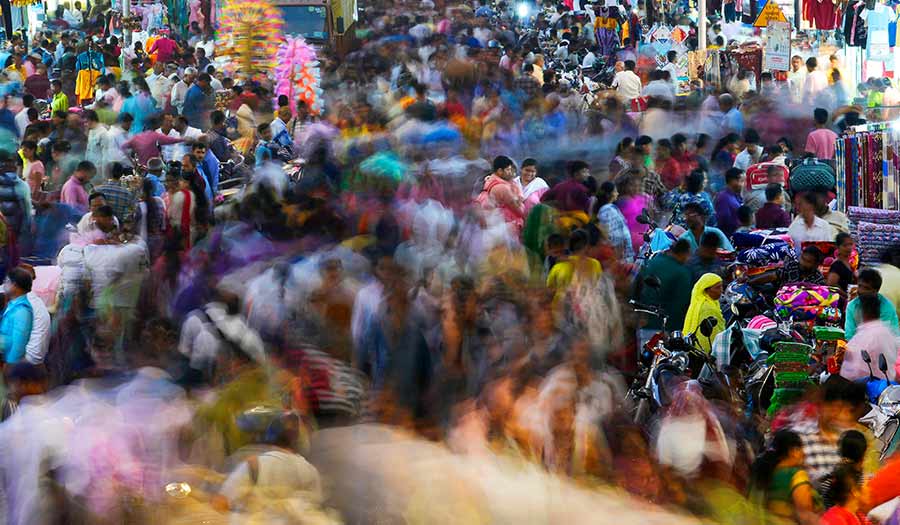 AP/Rajanish Kakade
AP/Rajanish Kakade
Article
Learn the why behind the headlines.
Subscribe to the Real Truth for FREE news and analysis.
Subscribe NowThe world’s population likely hit an estimated 8 billion people on Tuesday, according to a United Nations projection.
Consider: That is 8 billion men, women and children on Earth. We reached 7 billion only 11 years ago in 2011.
Much of the growth comes from developing nations in Africa. Among them is Nigeria, where resources are already stretched to the limit. More than 15 million people in Lagos compete for everything from electricity to light their homes to spots on crowded buses, often for two-hour commutes each way in this sprawling megacity. Some Nigerian children set off for school as early as 5 a.m.
And over the next three decades, the West African nation’s population is expected to soar even more: from 216 million this year to 375 million, the UN says. That will make Nigeria the fourth-most populous country in the world after India, China and the United States.
“We are already overstretching what we have—the housing, roads, the hospitals, schools. Everything is overstretched,” said Gyang Dalyop, an urban planning and development consultant in Nigeria.
Somewhat counterintuitively, this population growth stems from solving problems. According to the UN, “This rapid growth of the human population is a testament to achievements in public health and medicine, such as improvements in sanitation and disease control, better access to clean drinking water, and the development of vaccines, antibacterial drugs, and other effective medical therapies.”
These, coupled with improvements in nutrition and higher standards of living, the UN stated, have generated the unprecedented growth of populations throughout the world.
The whole situation lays bare the paradox of mankind: Capable of incredible advancement, coupled with terrible ills. Often, when the global community looks to solve one problem, it inadvertently causes many more.
Where It Is Headed
The UN’s Day of 8 Billion milestone on November 15 is more symbolic than precise, officials are careful to note in a wide-ranging report released over the summer that makes some staggering projections.
The upward trend threatens to leave even more people in developing countries further behind as governments struggle to provide enough classrooms and jobs for a rapidly growing number of youth, and food insecurity becomes an even more urgent problem.
Nigeria is among eight countries the UN says will account for more than half the world’s population growth between now and 2050—along with fellow African nations Congo, Ethiopia and Tanzania.
“The population in many countries in sub-Saharan Africa is projected to double between 2022 and 2050, putting additional pressure on already strained resources and challenging policies aimed to reduce poverty and inequalities,” the UN report said.
It projected the world’s population will reach around 8.5 billion in 2030, 9.7 billion in 2050 and 10.4 billion in 2100.
Other countries rounding out the list with the fastest growing populations are Egypt, Pakistan, the Philippines and India, which is set to overtake China as the world’s most populous nation next year.
In Congo’s capital, Kinshasa, where more than 12 million people live, many families struggle to find affordable housing and pay school fees. While elementary pupils attend for free, older children’s chances depend on their parents’ incomes.
“My children took turns” going to school, said Luc Kyungu, a Kinshasa truck driver who has six children. “Two studied while others waited because of money.”
Rapid population growth also means more people vying for scarce water resources and leaves more families facing hunger as weather upsets increasingly impact crop production in many parts of the world.
“There is also a greater pressure on the environment, increasing the challenges to food security that is also compounded by climate change,” said Dr. Srinath Reddy, president of the Public Health Foundation of India.
Beyond the Population Problem
Experts say the bigger threat to the environment is consumption, which is highest in developed countries not undergoing significant population increases.
Deutsche Welle summarized the findings of Global Footprint Network: “…if everyone on the planet lived like a citizen of the United States we would need the resources of at least five Earths. Living like a citizen of a country like Nigeria, however, uses only 70% of the world’s resources every year. For India, with its population of more than 1.3 billion, that figure is just 80%.”
According to the UN, the population in sub-Saharan Africa is growing at 2.5 percent per year—more than three times the global average. Some of that can be attributed to people living longer, but family size remains the driving factor. Women in sub-Saharan Africa, on average, have 4.6 births, twice the current global average of 2.3.
Yet any effort to reduce family size now would come too late to significantly slow the 2050 growth projections, the UN said. About two-thirds of it “will be driven by the momentum of past growth.”
“Such growth would occur even if childbearing in today’s high-fertility countries were to fall immediately to around two births per woman,” the report found.
There are also important cultural reasons for large families. In sub-Saharan Africa, children are seen as a blessing and a source of support for their elders—the more sons and daughters, the greater comfort in retirement.
Still, some large families “may not have what it takes to actually feed them,” says Eunice Azimi, an insurance broker in Lagos and mother of three.
Even as populations soar in some countries, the UN says rates are expected to drop by 1 percent or more in 61 nations.
The U.S. population is now around 333 million, according to U.S. Census Bureau data. The population growth rate in 2021 was just 0.1%, the lowest since the country was founded.
“Going forward, we’re going to have slower growth—the question is, how slow?” said William Frey, a demographer at the Brookings Institution. “The real wild card for the U.S. and many other developed countries is immigration.”
Said another way, even though the birth rate is stalling in some nations, the population boom in other nations will affect them through problems stemming from immigration.
Charles Kenny, a senior fellow at the Center for Global Development in Washington, says environmental concerns surrounding the 8 billion mark should focus on consumption, particularly in developed countries.
“Population is not the problem, the way we consume is the problem—let’s change our consumption patterns,” he stated.
Easier Said than Done
Experts point out that the world does have enough resources to sustain a population of many more than 8 billion individuals. The problem is how to distribute everything evenly.
“We do have the resources, but it requires a huge effort in political economy and geopolitics to actually get the resources where they need to go,” Vanessa Perez-Cirera, the global economics director at the World Resources Institute, told DW at the COP27 summit in Egypt.
If population growth and the amount of resources are not the problem, what is? It goes well beyond overconsumption.
The answer is the same as it always has been throughout history. Human beings are capable of impressive inventiveness and ingenuity. They can address certain problems related to public health and sanitation, which brought us past the 8 billion mark. But let’s face it: man cannot truly govern himself. The likes of inequality, hunger, oppression and division remain.
The prophet Jeremiah made this plain in the Old Testament: “O Lord, I know that the way of man is not in himself: it is not in man that walks to direct his steps” (10:23).
This is one of the towering lessons God wants all to learn today. Despite man’s best efforts, he cannot direct his steps. He cannot govern himself.
While God wants everyone to learn this, it is not the end of the story! The central message of the Bible is of the soon-coming Kingdom of God. It will be a world-ruling supergovernment led by Jesus Christ.
Under this divine government, population growth will no longer be a problem—in fact, it will be encouraged!
Isaiah 9:7 states this: “Of the increase of His government and peace there shall be no end, upon the throne of David, and upon His kingdom, to order it, and to establish it with judgment and with justice from henceforth even forever.”
At that time, resources will be fairly distributed to all. Micah 4:4 shows that everyone “shall sit every man under his vine and under his fig tree; and none shall make them afraid…”
As you watch the world grapple with its problems, remember what God wants you to learn: man cannot govern himself. Rather, we must look forward to the Kingdom of God, when all the terrible conditions today will finally be put to rest.
This article contains information from The Associated Press.



